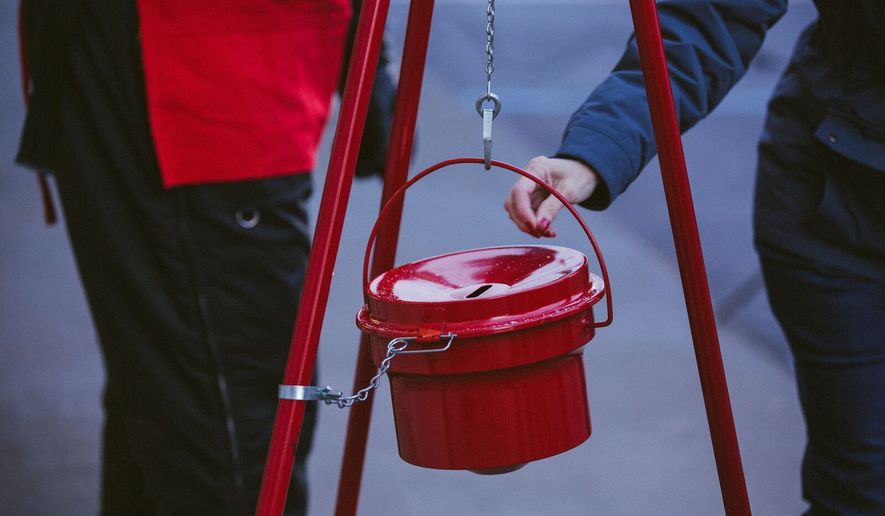A version of this story appeared in the Higher Ground newsletter from The Washington Times. Click here to receive Higher Ground delivered directly to your inbox each Sunday.
Charities entered GivingTuesday hoping to make up for waning donations and increased demand for assistance from struggling families over the past year.
Nonprofits such as food pantries and homeless shelters reported that rising grocery prices, a nationwide spike in food insecurity and a surge in working-class families and undocumented migrants seeking free social services had squeezed their budgets more than usual.
By 11 a.m. Tuesday, officials at the Haymarket Regional Food Pantry in Prince William County, Virginia, said they had raised about $30,000 of the $125,000 they needed to buy food. The number of unemployed and underemployed Virginians seeking free groceries at the volunteer-run pantry surged from 37,000 last year to 54,397 this year.
“I think by Jan. 1, we’ll clear it, but I don’t think that will happen today,” Eileen Smith, the pantry’s director, told The Washington Times. “Last year, we spent $125,000 on food. This year, we’ve spent $207,000, and next year we’ll easily spend $250,000 because of rising demand.”
Other charities interviewed by The Times likewise expressed hope that the Tuesday after Thanksgiving — first dubbed #GivingTuesday on social media in 2012 — would help them make up for lengthening lines at their pantries and shelters.
Michelle Wolfe, development director for the Salvation Army National Capital Area Command, said more foreign-born migrants and refugees have turned to the evangelical social services organization for help with food, rent, utilities and Christmas gifts for their children.
“Inflation is on the rise, and paychecks are no longer stretching as far as they used to,” she said.
“A dad recently told us that he was looking for barley, hemp milk and greens to make a dish typical in his home country,” Ms. Wolfe said. “He said it was just too expensive at the grocery store, but he wanted his children to grow up with an appreciation and understanding of their roots.”
According to the latest report from Giving USA, U.S. charitable donations dipped to $499.33 billion last year. Early projections suggest they will fall again this year. The report said stock market declines and high inflation have forced Americans to rethink their charitable giving.
In Lanham, Maryland, the Volunteers of America Chesapeake & Carolinas said donor participation in fundraising campaigns to support homeless shelters in the mid-Atlantic region has fallen 10% since last year as needs grow. As of Tuesday afternoon, the group had raised $2,000 of the $10,000 they hoped to collect by the end of the day.
“Given the shift in giving, we are working to adopt a more grassroots approach with our individual donors,” said Nicholle Granger, executive director of development and marketing. “We are also getting more creative by collaborating with even more charities and faith-based organizations than in years past to collectively appeal to donors.”
She said the nonprofit group’s Alexandria Community Shelter, which operates 64 beds and helps homeless people relocate to permanent housing in Northern Virginia, was at “full capacity.”
“With the downturn in donations to help cover housing application fees, security deposits, and short-term support for rent and utilities, many of the households we serve are remaining in the shelter longer than anticipated,” Ms. Granger said.
Over Thanksgiving weekend, news outlets reported that an increase in the population of illegal immigrants in New York City overwhelmed some food programs as migrants competed with established people in low-income neighborhoods for free turkeys.
The number of illegal immigrants lining up for social services has surged this holiday season as more Americans struggle for adequate food and water.
Officials at the Capital Area Food Bank, which coordinates grocery donations to 400 social services in the Washington region, told The Times in May that they distributed 16.9 million meals in Northern Virginia in fiscal 2022.
That was up from the 9.2 million meals the group’s Lorton, Virginia, warehouse gave away in fiscal 2019. The group is building a larger warehouse space to compensate.
According to charities nationwide, the end of emergency subsidies from the federal Supplemental Nutrition Assistance Program on March 1 made food insecurity worse.
Near the White House, Capitol Hill has become a food desert for low-income families since Walmart closed its store on H Street Northwest in March, according to the Father McKenna Center, a Catholic food pantry serving more than 1,100 people.
The Times reported that the tally of households getting groceries from the pantry next to Gonzaga High School rose from 16 to 23 per day in April. The number of homeless men eating cooked breakfasts and lunches increased by 40% from January to May. Meanwhile, the cost of meat rose by 10% to 15% from before the COVID-19 pandemic to May.
As of Tuesday afternoon, the McKenna Center did not know whether it would meet its donation goals for the year.
“Too early to tell, but we’re hopeful for a fruitful day,” said Tori Fernandez Whitney, the center’s acting executive director.
In a food insecurity report released Sept. 12, consumer research firm Attest found that 59.5% of 2,000 working-age adults selected for a July 12-19 survey panel said they struggled to afford food at least some of the time. It was the first time the company had surveyed the issue.
Elizabeth McGuigan, senior vice president at the Philanthropy Roundtable, a Washington-based nonprofit that advises right-leaning charities, said nonprofit fundraisers remained optimistic Tuesday despite the headwinds.
She pointed out that foundations and corporations gave a record $52 billion in charitable gifts through donor-advised funds last year, helping offset the pandemic-era decline in small donations.
“The landscape may be shifting, but overall, private philanthropy remains essential to helping those who are most vulnerable in our communities, just as it has throughout our history,” Ms. McGuigan said.
• Sean Salai can be reached at ssalai@washingtontimes.com.




Please read our comment policy before commenting.